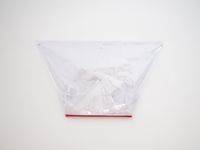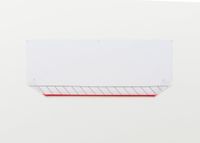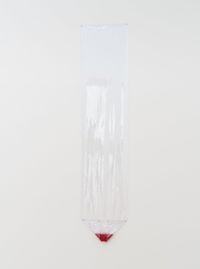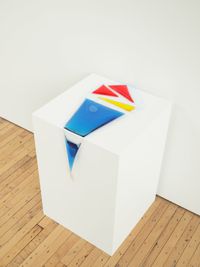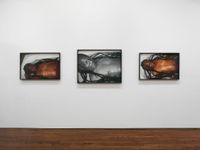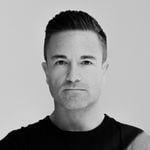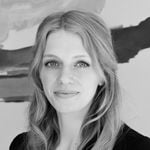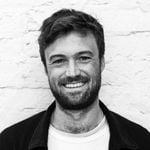Senga Nengudi is an internationally celebrated artist whose installations, performances, and photographic artworks explore the threshold between material and the body in motion.
Read MoreOften combining found objects such as pantyhose and masking tape with natural components that invite human activation, Senga Nengudi's artworks touch upon a constellation of interlinked concerns, from feminist considerations of body and environment to the confluence of different cultural and spiritual rituals.
Born in Chicago in 1943 and raised in Los Angeles, Senga Nengudi studied and taught art and dance. In the mid-1960s she spent a year in Tokyo, absorbing the experiments of the Gutai, as well as traditional theatre forms including Kabuki and Noh, which she combined with her existing interests in West African ritual. Nengudi then returned to America, graduating with a master's in Sculpture from California State University.
Catalysed by this period of racial inequality and civil unrest, young black artists including Nengudi, Maren Hassinger, and David Hammons rallied around Studio Z—a former dancehall on Slauson Avenue—where they worked together, organising concerts and events. During this period Nengudi experimented with everyday materials that captured the ephemerality and malleability of movement. The artist's 'Water Compositions' (1970–present), for example, comprise sculptural volumes of water in heat-sealed bags that appear halfway between geometric abstraction and formlessness.
Senga Nengudi's 'R.S.V.P.' series (1975–present) is the artist's most well-known work. Although begun earlier, the series received its title following a presentation of the work at Just Above Midtown in 1977—then New York's foremost centre for contemporary African American art. Made after the birth of her first son, and prompted by the physical and psychological changes she experienced during pregnancy, the work comprises dark-coloured pantyhose, which the artist fills with sand, knots, stretches and tacks to the gallery space. In its bulbous and pendulous form, the work is suggestive of a feminine body: limbs, breasts, buttocks, or womb stretched and ageing over time.
In its colour of dark brown, the work also specifically seems to suggest a black body, and indeed is considered a seminal work of the Black Arts Movement, Yet, as is reflected in its title—the French acronym of which entreats viewers to 'please respond'—Nengudi also invites a broad engagement. Reflective of a collaborative practice, iterations of the series have often involved another artist activating the work through improvised dance, using Nengudi's sculpture as a prop or dance partner.
In 1987, Senga Nengudi instigated Ceremony for Freeway Fets, a collaborative performance held at a Los Angeles freeway underpass to mark the installation of Nengudi's public artwork, Freeway Fets. Performed using masks, supermarket products and stage settings, Nengudi combined elements of Japanese theatre with free jazz and West African dance. The artwork, preserved in eleven iconic photographs, is a testament to her ongoing influence in the expanded sculptural field. In 2020, the art museum Lenbachhaus, Munich, paid tribute to the artist's more-than-40-year career with the critically acclaimed retrospective Topologies. The exhibition is forthcoming at Denver Art Museum.
Senga Nengudi lives in Colorado currently.
Topologies, Lenbachhaus, Munich (2019); Senga Nengudi, The Fruitmarket Gallery, Edinburgh (2019); Senga Nengudi, Henry Moore Institute, Leeds (2018); Head Back & High: Senga Nengudi, Performance Objects (1976–2015), Baltimore Museum of Art (2018); Senga Nengudi, ICA Miami (2017); The Material Body, Museum of Contemporary Art Denver (2014).
57th Venice Biennale (2017); Soul of a Nation: Art in the Age of Black Power, Tate Modern, London (2017); We Wanted a Revolution: Black Radical Women, 1965–85, Brooklyn Museum, New York (2017); Blues for Smoke, Whitney Museum of American Art, New York (2013); Radical Presence: Black Performance in Contemporary Art, Contemporary Art Museum Houston (2012); Now Dig This! Art and Black Los Angeles, 1960–1980, Hammer Museum, Los Angeles (2011); and WACK! Art and the Feminist Revolution, Museum of Contemporary Art Los Angeles (2007).
Amy Weng | Ocula | 2020
